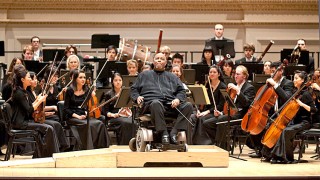Title

James DePreist has been the director of orchestral and conducting studies since 2004. After the commencement concert, which takes place on May 19, he becomes the principal conductor and director emeritus.
(Photo by Nan Melville)Commencement is typically a time for celebration and reflection. At Juilliard, the festivities traditionally begin with an orchestra concert, which for many of the players is their last performance with the Juilliard Orchestra before embarking on professional careers. This year’s concert, which will feature Brahms’s Violin Concerto and Saint-Saëns’s “Organ” Symphony, is unique in that both maestro and musicians will be observing milestones. At the end of this season, James DePreist, who has been director of orchestral and conducting studies since 2004, will pass the literal and figurative baton to Alan Gilbert, music director of the New York Philharmonic, and will assume the title of principal conductor and director emeritus of the Juilliard Orchestra.
Body
DePreist will mark a second milestone in November with his 75th birthday, and he took the opportunity, in a recent conversation with The Journal, to reflect. A birthday “forces you to look back,” he said. “At 75, you say, ‘What have I accomplished with my life and what is there that I can still do that I have not yet done?’”
It would be easy for DePreist to rest on his laurels. His career has spanned five decades and several continents, and has seen him as music director of the Orchestre Symphonique de Québec, the Malmo Symphony Orchestra, the Monte-Carlo Philharmonic Orchestra, and the Oregon Symphony, for which he is the laureate music director. His recorded legacy includes collaborations with the Helsinki Philharmonic and the London Symphony Orchestra, and in 2005 he was awarded the National Medal of Arts, the country’s highest honor for artistic excellence. While proud of these achievements, he doesn’t dwell upon them. “You can’t accomplish very much in life if you’re constantly patting yourself on the back for what you’ve already done,” he said. “You have to keep your eyes forward.”
Now he will have a chance to set some new goals for himself. “I remember at the very beginning of my career, I had a shelf full of study scores,” he said. “I would go through these scores and say, ‘Someday I hope that I can conduct this,’ or ‘Someday I’ll be invited to do this.’ [Now], I’ve gone through all of the major works that I wanted to do several times over.”
“I’ve done Mahler Five many times, and each time it’s fresh and exciting,” he continued, “but I think there’s a point at which you must direct your attention to teaching so you can really give back and share the experience and insights you’ve gained over the years. The opportunity I’ve had here at Juilliard has opened my eyes to that.” He mentioned that he hasn’t previously done any private teaching outside of an institution and that after this season, “the area of education will be the one to which I gravitate.”
It should therefore be no surprise that DePreist expressed considerable satisfaction with his pedagogical work to date. “I’ve been very excited about having had the opportunity to work here on a regular basis at Juilliard in developing young conductors. I have found it very gratifying, particularly because of the success of the students who have left here,” he said. Almost all of his students, he added, “have either won competitions or have prime positions with orchestras.”
DePreist, who contracted polio as a young man while on tour for the U.S. State Department in Bangkok, conducts from a specially engineered motorized chair. He has been an active advocate in the fight against the spread of the disease, partnering with renowned violinist and Juilliard faculty member Itzhak Perlman and Rotary Club International. “Itzhak has been a really tireless spokesperson for the Rotary Club’s efforts to end polio worldwide,” DePreist said, noting that he and Perlman had recently performed a concert with the Chicago Symphony “to highlight their efforts in this area, and the fact that there’s just a very little bit left to be done to eradicate polio. I was happy to join him for that, since we both have had polio and understand the limitations that are placed upon one [who] happened to have had that disease. Itzhak and I are doing whatever we can to raise consciousness about the efforts of Rotary International.”
As principal conductor and director emeritus, DePreist will continue to be a familiar face at Juilliard for at least the next several seasons. After this month’s concert, his next scheduled appearance with the Juilliard Orchestra is in December at Carnegie Hall.




